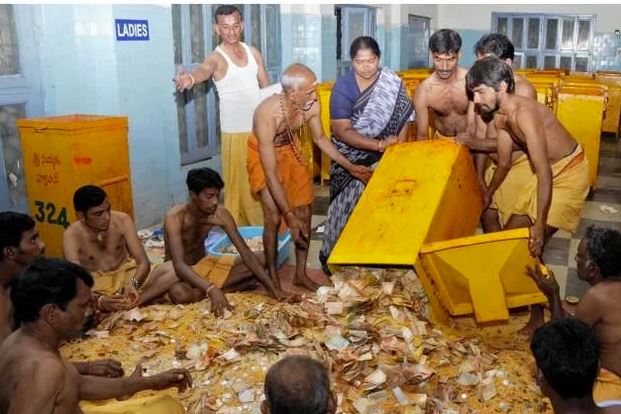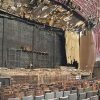Goa is abuzz with excitement as vintage bike and car owners, users, collectors and fans are decking […]

EDC — A COLLECTION BOX FOR MLAS
Nov 2-Nov 9 2018, Stray Thoughts November 3, 2018CAPTION: Just as temple collection boxes provide an easy and available source of funds, for the government, corporations like the EDC can be used and misused as a source of funds and to ‘reward’ adherents
BY RAJAN NARAYAN
And a few stray thoughts for yet another Saturday. For a Saturday following a week when there was continued concern over the health of Chief Minister Manohar Parrikar. For a Saturday following a week when we failed to understand why the Power Department is finding it difficult to find graduate electrical engineers when the state has five engineering colleges. For a Saturday following the week when Arun Baba Naik, the highly respected owner of a pharmaceutical company, and the first Goan to graduate from what was called the University Department of Chemical Technology — now the Institute of Chemical Technology (ICT) — suggested that corporations were like cash boxes in temples.. For a Saturday following a week when small and medium companies have been badly affected by the credit squeeze and the falling rupee.
BJP STRIFE
And a few stray thoughts on the continued concerns over the health of the Chief Minister Manohar Parrikar.
Whether or not we go by the version of Rohan Khaunte, who claims that Parrikar actively participated at the half hour meeting of the Investment Promotion Board (IPB), it is clear from the picture released that he is not fit to preside over the state.
Indeed, doctors I met this morning claimed that the photograph was a staged photo op, and the chief minister could sit only for a few minutes. What is clear is that the chief minister is in no condition to continue in his position, let alone handle the 30 portfolios that he holds. There has been no governance of any sort for the last nine months since the chief minister took ill. As it is explained in detail in our cover story no State can function without the chief minister for even 24 hours, let alone nine months. The chief minister, like the prime minister and the president, are top government officials whose permission is needed to implement any policy or programme.
Finally, after months of speculation, Health Minister Vishwajit Rane admitted that the chief minister has pancreatic cancer. This has been confirmed by BJP State president Vinay Tendulkar. For the last nine months this very serious medical condition of the chief minister has been cloaked in a veil of secrecy, with both doctors and the party only admitting that he had a pancreatic ‘ailment’ — giving the impression that he had just a minor problem and not pancreatic cancer which is the second largest killer in the world, second only to breast cancer.
The curious part is that Parrikar’s party colleagues at the Centre, who hold very senior positions, have been quite transparent about the state of their health. Finance Minister Arun Jaitley, for instance, not only admitted that he had a kidney transplant, but took leave for three months so that he could get enough rest after the transplant. Even now the Jaitley has his room insulated and talks to his officials via teleconferencing to avoid infection. Similarly another senior BJP leader and member of the Cabinet, Anand Kumar, admitted to having cancer and after prolonged treatment in London has returned to Bangalore where he is continuing treatment. Minister for External Affairs Sushma Swaraj has announced that she will not be contesting the 2019 parliamentary election because she has also had a kidney transplant.
Under the circumstances we fail to understand why there is so much secrecy over the health of the chief minister. A single picture of his addressing the IPB gives no indication of his actual state of his health. Logically there should be regular bulletins issued on the state of his health so that his colleagues and the people of Goa can decided whether he is capable of fulfilling his responsibilities as chief minister. IT Minister Rohan Khaunte has been frank enough to admit that he does not think the chief minister will be back in the secretariat to work full time in the near future.
Parrikar owes it to Goa and Goans to stop down permanently or temporarily and nominate a substitute to carry on his responsibilities until he is completely fit. Particularly because besides being chief minister he holds the Finance and Law and Order (commonly referred to as Home) portfolios.
ELECTRICITY DEPT SHORT STAFFED?
And a few stray thoughts on the Electricity Department suffering from an acute shortage of not only top officials but even linesmen.
New Power Minister Nilesh Cabral has revealed that the Power Department does not have either a chief engineer or superintendent engineers who are the second-most senior officials. Most of the posts of executive engineers are occupied by diploma holders — thought the rules do not permit them to do so. There is tussle going on between the diploma holders and the degree holders.
The problems of the Power Department go back to the pre-Liberation days. Power distribution was through generators for the top Portuguese officials in the state as Goa did not have a power generation facility. In fact Goa still does not have a capital power generation facility. After Goa was liberated it started getting its requirement of power from the national power grid.
Though power was now available to provide electricity for the entire population and not just for the ruling class there were no manpower to manage the power distribution system. During the Portuguese colonial regime there were no engineering colleges, polytechnics or even industrial training institutes. The only professional college was the GMC which was set up for the benefit of the Portuguese army in its African colonies and not for the benefit of Goans. Which is why migrants from Kerala, Karnataka and Maharashtra were recruited in large numbers for meeting the manpower requirements of the Electricity Department.
The electrical engineers did not show much interest and it was primarily diploma holders who applied. The than government of Goa has no choice but to appoint them to the post of junior engineer and over the period of time they were promoted to the rank of assistant engineer. Even though diploma holders are not promoted to the position of executive engineers, the rules were changed to meet the acute shortage of staff. The problem remains of filling the top positions of chief electrical engineer and four superintending engineers who are all acting in their post and are yet to been confirmed.
One can understand the difficulty filling the posts of electrical engineers before Liberations as there no were engineering colleges. The Government Engineering College is now 50 years old and must have produced enough electrical engineers to meet the requirement of the Electricity Department many times over. Now there are five engineering colleges and so the Electricity Department should not have problems getting graduate engineers to fill up all vacancies. We cannot help wondering whether the posts are not filled because the engineers are not willing, or cannot afford, to pay the bribes being demanded.
CARROTS FOR ALL
And a few stray thoughts on the very apt comparison made by Arun Baba Naik of temple collection boxes and corporations set up by the government of Goa.
While the temple collection boxes are for the benefit of the trustees and the poojaris, the chairmanship of corporations is to keep MLAs who could not be accommodated in the Cabinet happy. The next best thing to a Cabinet post for making money is the chairmanship of a corporation.
The former Congress MLAs, Shubash Shirodkar and Dayanand Sopte, who quit the Congress and joined the BJP have to be rewarded. If they are not rewarded they may go back to the Congress again or join some other party. There is no question of giving them a Cabinet berth as nobody from the Cabinet can be dropped without a revolt.
The situation for the BJP had become worse with the revolt of veterans with Laxmikant Parsekar, the former chief minister, senior leader Rajendra Arlekar, and former RSS chief Shubhash Velingkar ganging up.
The sacrificial goat has been Sidharth Kuncalienker, a one-time favourite of Parrikar who seems to have fallen from grace. Sidharth was so close to Parrikar that he was made joint secretary to the chief minister, which has proved a mixed blessing because he had become an accused in one of the cases filed against the chief minister. Subsequently Sidharth was given charge of both the Economic Development Corporation and the GSIDC which has the biggest budget in the State and has been entrusted with the biggest building projects, as Parrikar wanted to neutralize the PWD. Sidharth Kuncalienker who could only be given the vice chairman’s post in the GSIDC was subsequently made chairman of the EDC.
Though the EDC was the first financial agency started to boost industry in the State nobody treats its seriously as a lender any longer because of the very high rates of interest. But the EDC is the biggest landlords in the State since it owns the Patto complex which is the HQ of several leading business houses. The chief minister’s Rojgar scheme which is also managed by the EDC is very popular because it gives loans to motor cycle pilots and gaddo owners and other tiny and small businessman at a concessional rate of interest and even contributes to the share capital. Which is why Subhash Shirodkar has been given the chairmanship of the EDC in place of Sidharth who, following his master’s orders, has resigned his post.
Dayanand Sopte is still awaiting his reward which is likely to be the chairmanship of the GTDC. Sopte has caused a lot of embarrassment to Parrikar and the BJP leadership by insisting that he defected from the Congress because he was promised a Cabinet post. Though he was made the power minister, Nilesh Cabral has not yet been told to vacate the position of chairman of the GTDC.
The EDC has been looted and plundered by almost every chief minister and chairman of the corporation with the sole exception of the first chairman and MD, the late JC Almeida. The main source of revenue both to the EDC and those controlling the EDC in the ‘80s and the ‘90s were the steel rolling mills. The steel rolling mills were encouraged to set up units in Goa in very large numbers with the promise that they would get huge rebates on their main raw material power. Steel rolling mills are basically factories with a blast furnace which convert scrap into various kinds of finished steel materials like rods and wires for the use of the construction industry. Majority of those who setup steel rolling mill were crooks from Delhi and Haryana who were not happy with the huge profits they made but even resorted to stealing power on a large scale. It was a scam because Goa offered them huge rebate in power though it did not have a captive source of power supply and was dependent on Delhi for supply of power.
The scam came to an end when the then Chief Minister Pratapsingh Rane decided to stop rebates to steel rolling mills. Despite the ban on extending rebates to steel rolling mills the power minister in the cabinet, Mauvin Godinho, continued to extend huge rebates, provoking Parrikar, who had become an MLA, to file a case against him. The case against Mauvin for granting rebates despite the Cabinet stopping them is still going on.
The biggest joke about the EDC was the fight that broke out between the GPCC president Luizinho Faleiro and the new chief minister, Manohar Parrikar. Among the first statements made by Parrikar was that Luizinho Faleiro had looted and plundered the EDC. Which was largely true because it was Luizinho who created a special category of loans and extended fresh loans to huge existing defaulters at very high rate of interests in the name of working capital. Neither the original loans nor the new loans were recovered and finally all the steel rolling mills had to be sold by the EDC to a group of businessmen from Karnataka.
During the war between Parrikar and Luizinho, both brought out black papers accusing each other of destroying the EDC. Against Parrikar’s charge that Luizinho had destroyed the EDC, Luizinho claimed that Parrikar had given a one-time settlement, waiving not only the interest but even part of the principle, to the chief minister’s brother-in-law, for his company Simchem Pvt Ltd. The response of Parrikar was to bar the media from publishing any reports of Leader of the Opposition Luizinho Faleiro.
I must mention one more hilarious incident in connection with EDC. The Delhi types who borrowed huge amounts but did not return them took to all kinds of tamasha to get extension of time to pay so that the assets would not be auctioned. When Digambar Kamat was chief minister and Sanjit Rodrigues was the MD of EDC I happened to be present in the chief minister’s chamber. A family which owned hundreds of crore to EDC gate crashed bringing the grandfather who must have been in his ‘90s on the stretcher. The sons made the highly unlikely threat that if the assets were auctioned and they were not given more time, the grandfather would jump out of the window of the chief minister’s office. But Digambar gave them the benefit of doubt and asked Sanjit to give them more time to pay.
SMALL INDUSTRIES SUFFER
And a last stray thought on the small and medium scale industries being the worst affected by the highway robbery of banks by big industrialists.
Banks not only lent money based only on personal guarantees, but chased the very rich offering loans. This includes the Vijay Mallyas and the Nirav Modis and the Neeraj Singals and the Dhoots who manufacture Videocon TV sets, not to mention Anil Ambani and the biggest defaulter of them all — IL&FS, the government infrastructure giant which owes `1,900 crore.
But small and medium units which wanted loans of a few crore or lakhs were denied loans on flimsy grounds and asked to produce all kinds of sureties. Goan Observer is an example of a small company which is a victim of the banks.
With small companies the problems is cash flow. You may get orders for your product and it may happen with the majority of the small and medium companies in the various industrials states. But there may be a huge delay in payment. In the meanwhile the industries have to meet their raw material costs and other fixed costs including salaries. When they approach a bank for even over drafts they are asked for unreasonable security.
After the arrest of the top management of the Punjab National Bank in the Nirav Modi scam, and even the resignation and continued investigation of Chanda Kochhar, CEO of ICICI, the largest private sector bank, public sector banks in particular have become very tight fisted. The banks which were so generous in extending loans to the big sharks are refusing to lend to anybody as they are afraid of getting arrested.
Small and medium sized companies have also been hit by the falling rupee as part of the production depends on import of raw materials. It is important that the government should come to the rescue of small and medium companies who provide the maximum employment in the State.















